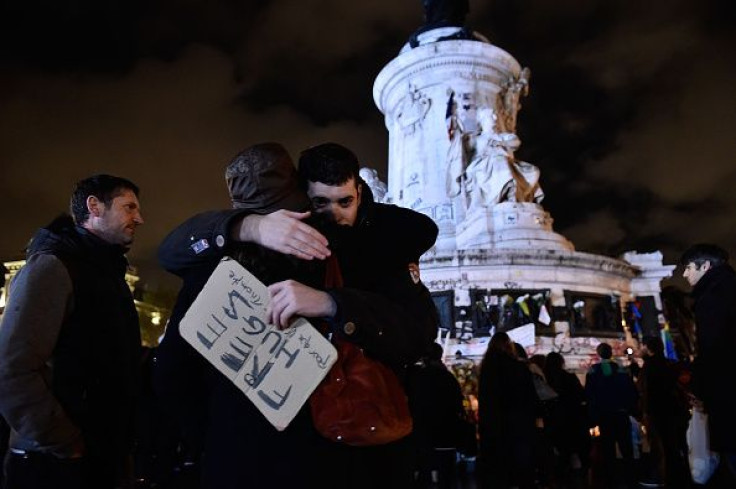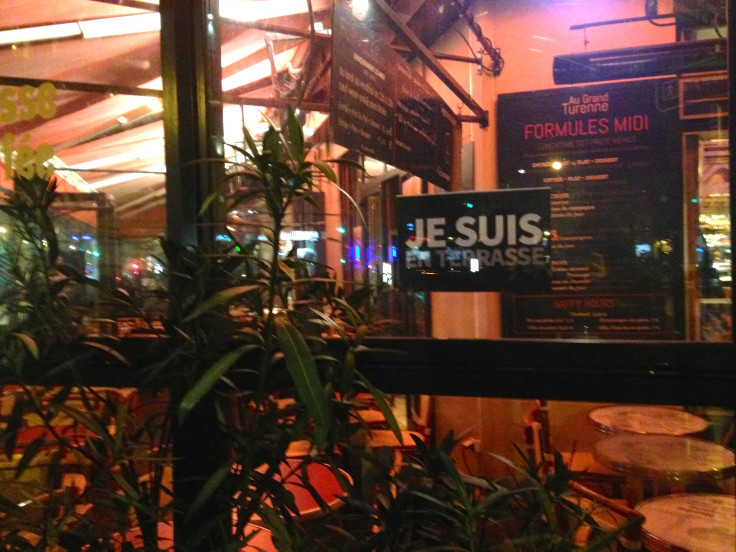Paris Terror Attacks Controversy 2015: Parisians Circumvent State Of Emergency Ban On Protests With Memorials At Place De La République, Group Demonstrations Of Solidarity

PARIS -- Océane Billy, 22, has been standing at Place de la République every day this week with a sign that says “Free Hugs.” She said her effort to comfort her fellow Parisians was a kind of demonstration or protest, a way of expressing love and a lack of fear.
She was happy to come to the square and participate in songs and candle-lighting, though the moment the emergency order was lifted, she hoped that everyone would be on the streets for a large demonstration. “It is unimaginable that there would be a time when we didn’t protest, it’s ingrained in our culture,” she said.
Exactly one week after a series of terror attacks rocked the city, leaving 130 dead and several hundred wounded, Parisians reunited at Place de la République square to pay homage to the victims. Visitors passed through to lay flowers and light candles around a monument that symbolizes the liberty of the French republic. Despite a state of emergency issued by President François Hollande, which banned protests or organizing in large groups until Sunday, Parisians have found creative ways to honor the dead, forming makeshift protest movements in restaurants and public squares, insisting on their right to liberty in grief.

“I hope there will be a huge protest after this, because these were young people who were massacred,” said Evelyn Chevilliard, 66, a self-described "ex-hippie" who participated in the French student riots of 1968. Chevilliard said she understood the logic behind the state of emergency when the search for the terrorists was ongoing, but now that they have reportedly been killed or arrested, she isn't sure it's necessary. “We’re leaving the door open to have an indefinite state of emergency, and I’m skeptical of that idea,” she said.
Protest culture plays a large role in French public life. The French people take their duty in a participatory democracy very seriously, and many Parisians joke that members of government never have to wonder if a law is unpopular because if it is, the next day there will be thousands of people in the street. Everyone from public transport workers to farmers to policeman hold huge national strikes each year to lobby for change.
Young Parisians in particular have found ways of getting around the decree against public demonstrations. Each night, a group named “Paris Est Toujours Une Fete” (Paris is Still a Party) encourages residents to put their speakers on their windowsills and put on a specific playlist at exactly 7 p.m. every night. Over 15,000 people have responded “yes” to the invitation, posting photos and words of encouragement to each other. “Turn on your speakers, open your windows and let music resonate in the streets of Paris,” read the invitation on their Facebook page.

Other movements have included “Tous Au Bistro” (Everyone to the Bistro) or “Je Suis en Terrasse” (I'm On the Terrace), to encourage people to go out at night, to drink, to eat and to be outside together. Several of last Friday's attacks were perpetrated when terrorists sprayed machine gun fire across the outdoor terraces of cafés, bars and restaurants in Paris. These kinds of attacks is understood by the Parisian people as an assault on their way of life.
One local resident agreed with the ban. “They are trying to keep us out of harm’s way,” said Leslie Masson, 28, who lives near the site of one of the attacks.
Matteo Maggio, 18, a young resident of the neighborhood who came to join the crowds at Place de la République on Friday explained that there was not a big difference between the “Tous Au Bistro” movements and other forms of protest. “It’s all in this same message, to show we are not afraid,” he said.
© Copyright IBTimes 2024. All rights reserved.












